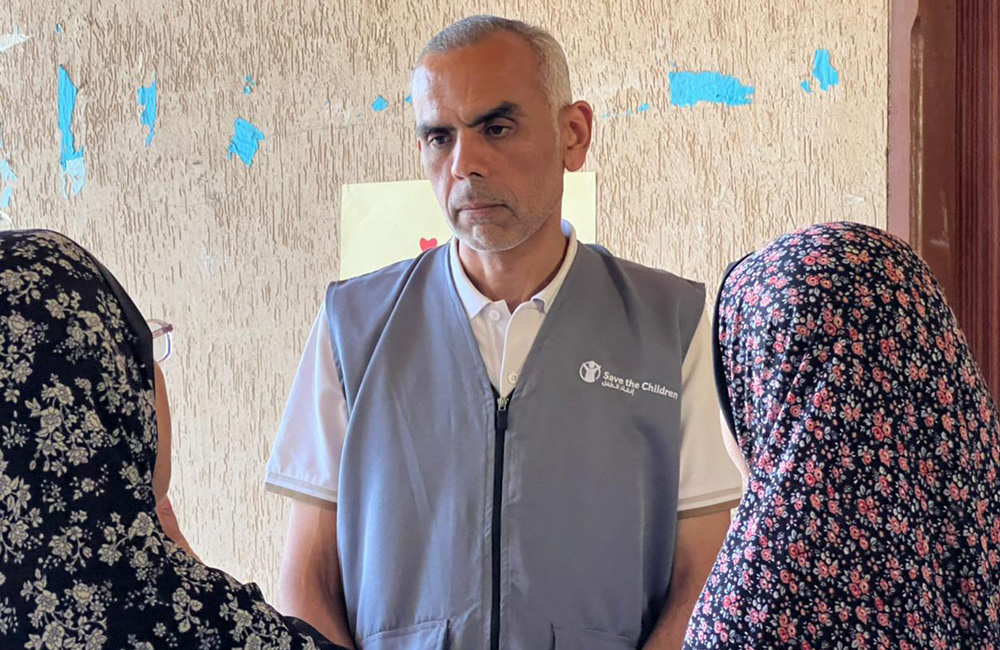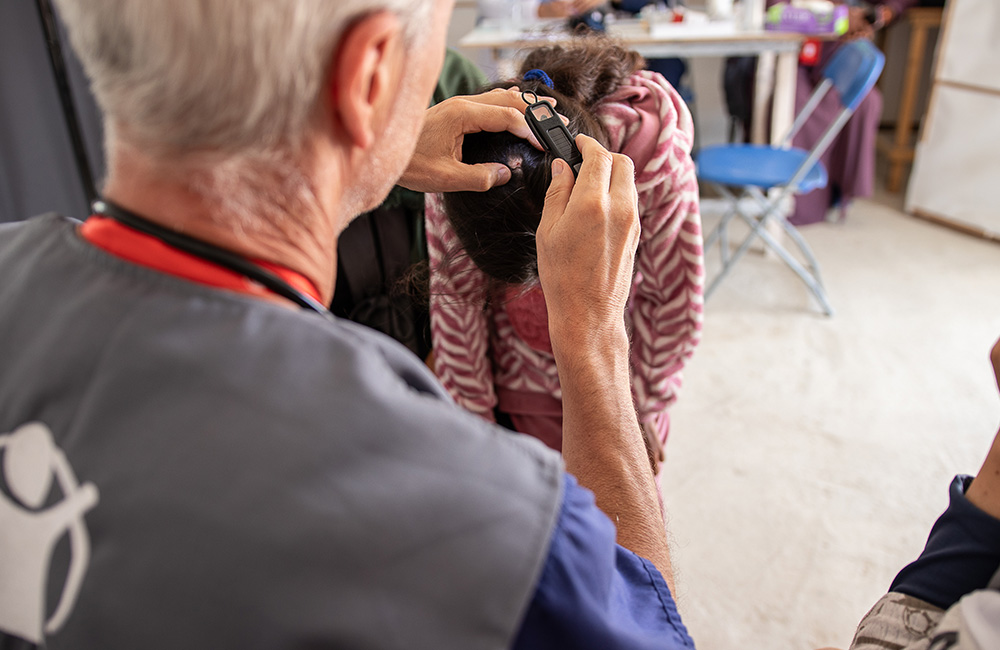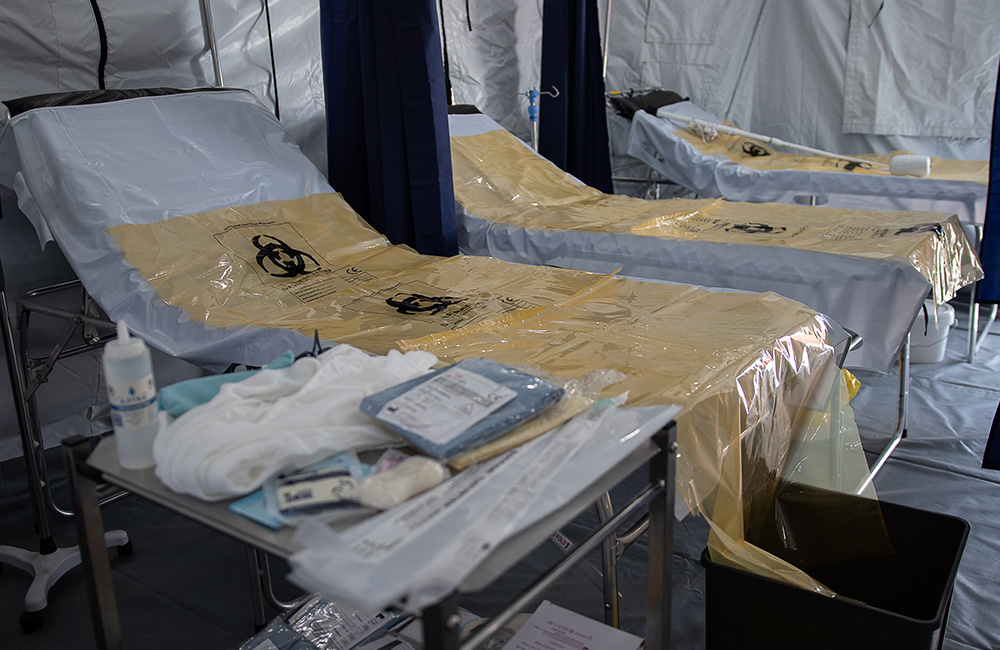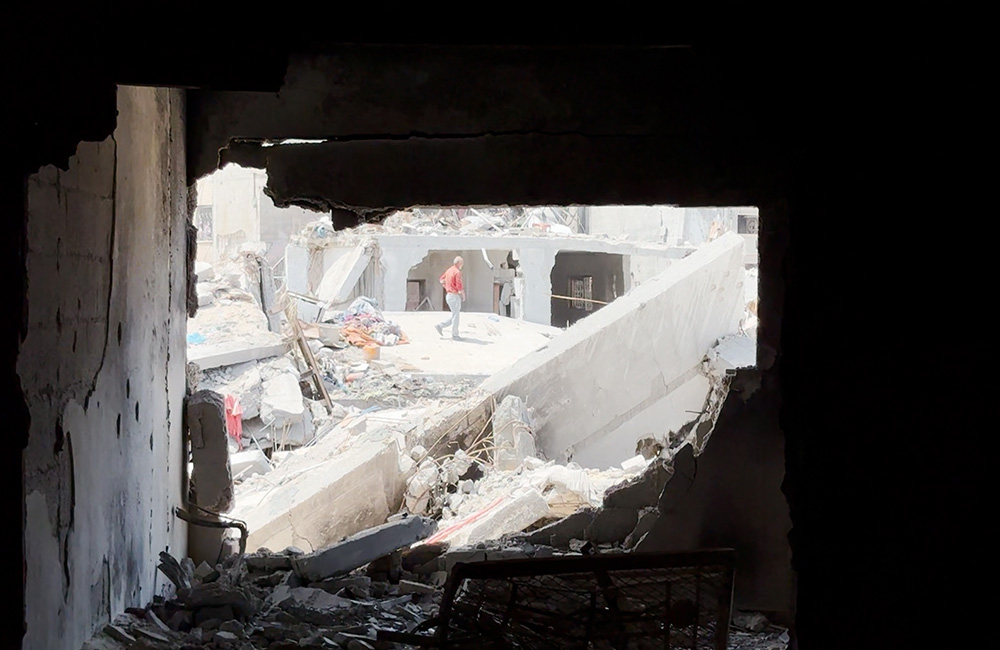Provide care and stay alive
“Imagine you’re a surgeon with a patient whose limbs have been severed and who is bleeding profusely and you’re expected to save his life with your hands tied behind your back and your eyes blindfolded. This is the reality for healthcare workers in Gaza.”
I am Dr. Jamal Imam,* a physician whose journey took an unexpected turn 14 years ago when I began working in the Gaza Strip, a place where children’s lives hang in the balance every day – more now than ever. I have spent years navigating the immense challenges of providing care in the face of a 17-year blockade and repeated wars.
I began working with Save the Children as a nutrition specialist at the onset of the war in October last year. I provide care and support to children suffering from malnutrition under extremely challenging conditions. My story is not just about medicine – it’s about survival, resilience, and the unyielding spirit of a people under siege.

Dr. Jamal Imam* is a physician who returned to Gaza in 2010 after leaving it as a child.
Photo: Save the Children.
What success looks like
Every day, I witness countless agonising stories – children I’m trying to save, mothers who come to me hoping I can perform miracles to rescue their little ones. They are all stripped of the most basic necessities for survival, and we are stripped of the essential tools to save lives; medical supplies and the materials we need to do our jobs. They come to me needing everything – not just the medical care I’m supposed to provide, but everything – from the food that will keep them alive to the sense of security they desperately crave. And here we are, nearly powerless in the face of such overwhelming need. We offer what we can, but the severe shortage of medications and supplies leaves us almost helpless.
One child I met, Amjad* was not even one year old, and he was suffering from severe acute malnutrition and battling skin infections. Not a single pharmacy in the entire Gaza Strip had the cream needed to treat his skin condition. You can’t imagine the amount of work, effort, phone calls, and attempts that were made to secure even the bare minimum to treat Amjad. After weeks of struggle, we began to see some improvement. Amjad moved from severe, critical malnutrition to a more moderate state. This may not seem like a significant success to an outsider, but given the limited resources we have, and the tremendous effort it took to secure them, it was a major success that this child will live to see another day.

A Save the Children medical aid worker inspects a child for a skin condition in Gaza.
Photo: Sacha Myers / Save the Children.
What tomorrow might bring
Beyond being an aid worker, I am a father, a husband, a Palestinian who feels the same pain and fear as everyone else here. The relentless bombings, the loss of basic necessities, the displacement, and the erosion of security make it almost impossible to fulfil my responsibilities as a parent. I am also a doctor, relied upon by patients who are suffering under the same brutal conditions. How can I give the care that’s expected of me, save lives, and improve health when I’m constantly gripped by the fear of what tomorrow – or even the next hour – might bring?
Electricity has been cut off since the beginning of the war. We get a little power from a few solar panels here and there, which is barely enough to charge a battery or provide minimal lighting. The internet is just as unreliable. We can hardly get enough coverage to send or receive a simple message to reassure our families or stay informed about what’s happening around us. Bombing has destroyed the water networks, rendered desalination plants and power plants out of service. My family can go days without having enough clean drinking water.

A Save the Children maternity ward in its Emergency Health Unit in Gaza.
Photo: Sacha Myers / Save the Children.
Food has also become extremely scarce. Months go by without us seeing any vegetables or fruits, let alone meat or dairy products. And then there’s the displacement. Imagine dealing with all these challenges – no food, no water, no energy – and then waking up one morning to find 20 people at your door, forced from their homes by bombings or relocation orders, with nowhere to go. Now, you have to find a way to feed five times the number of people you were barely able to provide for yesterday. Today, my parents and my wife’s parents are living with us in my home, and tomorrow, my family and I might have to move into my brother’s house – where there will be no electricity, no internet, no water, nothing.
An unwavering spirit
Amid all this exhaustion and the constant battle to secure the bare essentials for survival, there’s an emotional burden that words can’t fully capture. I live every day gripped by the fear that today might be the day I lose a family member, a colleague, a child I’ve been supporting, or even my entire family in a single airstrike. The fear that I might come back from work to find that my neighbourhood has been bombed, and that I’ll return to find my children’s remains gathered in a plastic bag. This is a reality in Gaza. It’s what haunts us all, day and night, shattering our sleep and consuming our thoughts.

Rubble in Khan Younis, where families are frequently seen digging through the rubble and pitching tents
in an area without adequate access to food and water.
Photo: Bisan / Save the Children.
Choosing to work as an aid worker in a place as challenging as Gaza wasn’t a random decision. It was the inevitable result of witnessing the suffering and tragedies here firsthand. Relief workers here are not just professionals; they are people living through the same hardships, experiencing the same pain, and witnessing the same horrors as those they are trying to help. There is no way to separate their work from their personal life –because their work is their life.
By now, you might be wondering where the strength comes from that keeps me standing today. The truth is, I don’t really know. That’s the honest answer. I don’t know where this strength comes from. But I do know that I’m not alone in this, and this strength is not mine alone. There seems to be something here in Gaza that grants everyone an extraordinary ability to endure and persevere. The resilience of Gaza’s people, despite the unimaginable horrors of war, has inspired me deeply. They refuse to lose their will to live, clinging to a love for life that defies all odds. Seeing this unwavering spirit, especially in children, compels me to stand by them.
I dream of an end to this war and seeing those responsible for the killing and displacement of children and families held accountable. I dream that somewhere, someone will make it their mission to end this war and give us our lives back.
Dr. Jamal Imam is a physician who returned to Gaza in 2010 after leaving it as a child. With extensive experience in Sudan and the UAE, he has dedicated his medical skills to serving children in Gaza for the past 14 years. Dr. Jamal has worked with international organisations, focusing on child health and nutrition, and has joined Save the Children health team at the start of the offensive in Gaza.
*Name changed for security reasons.